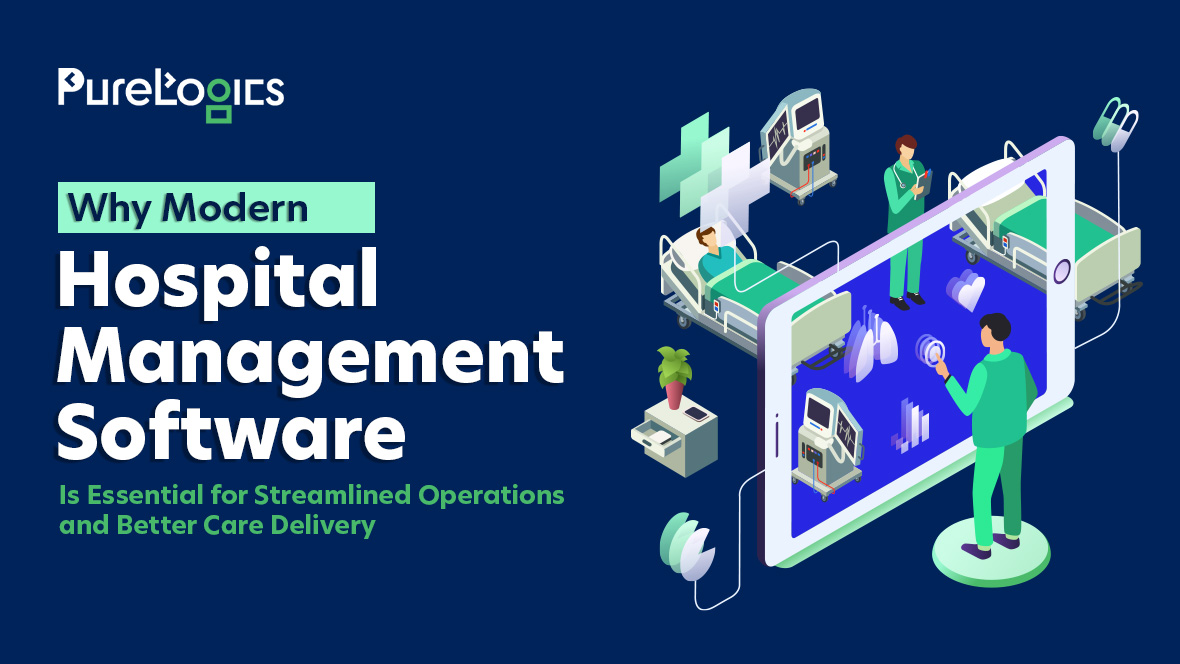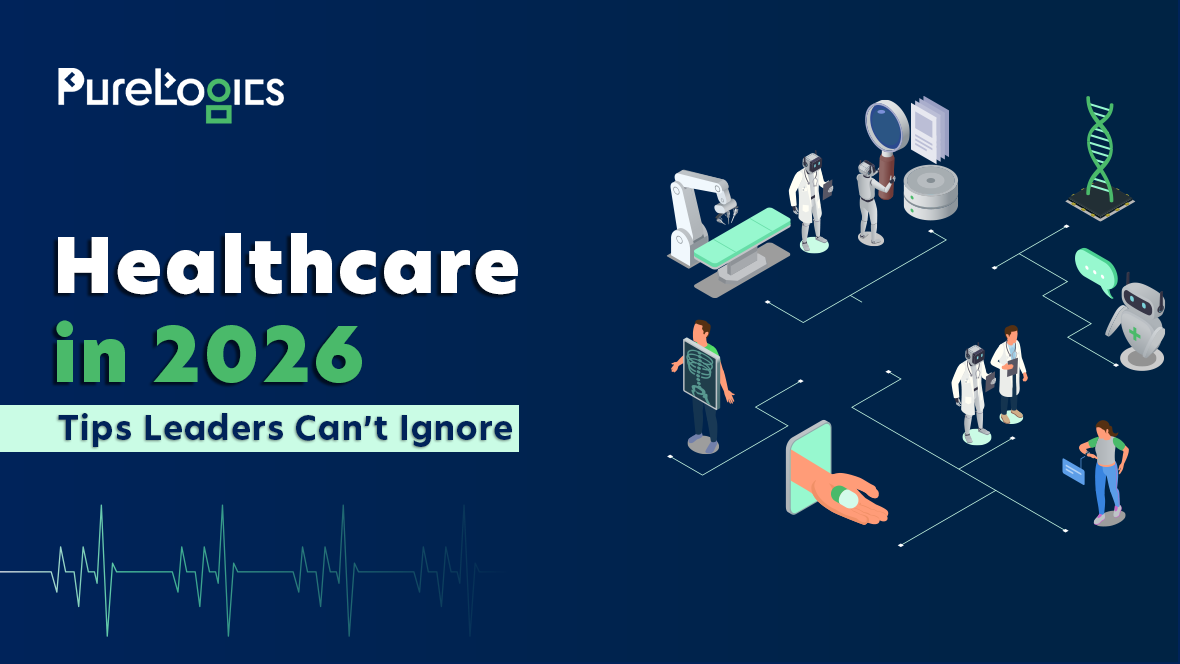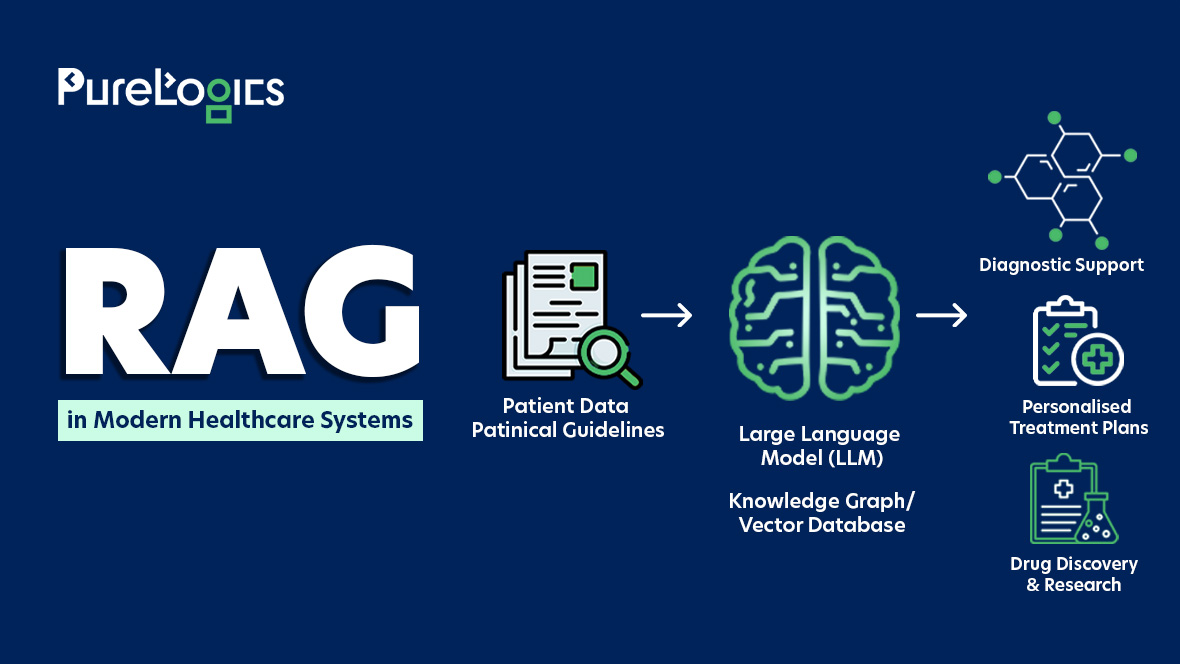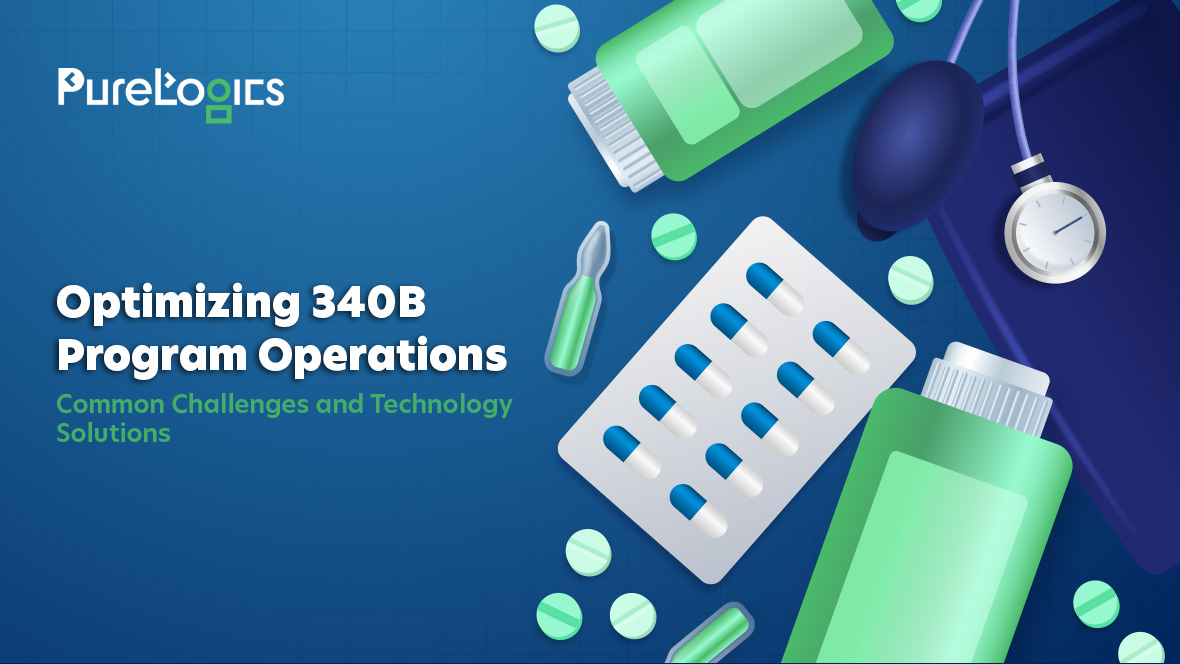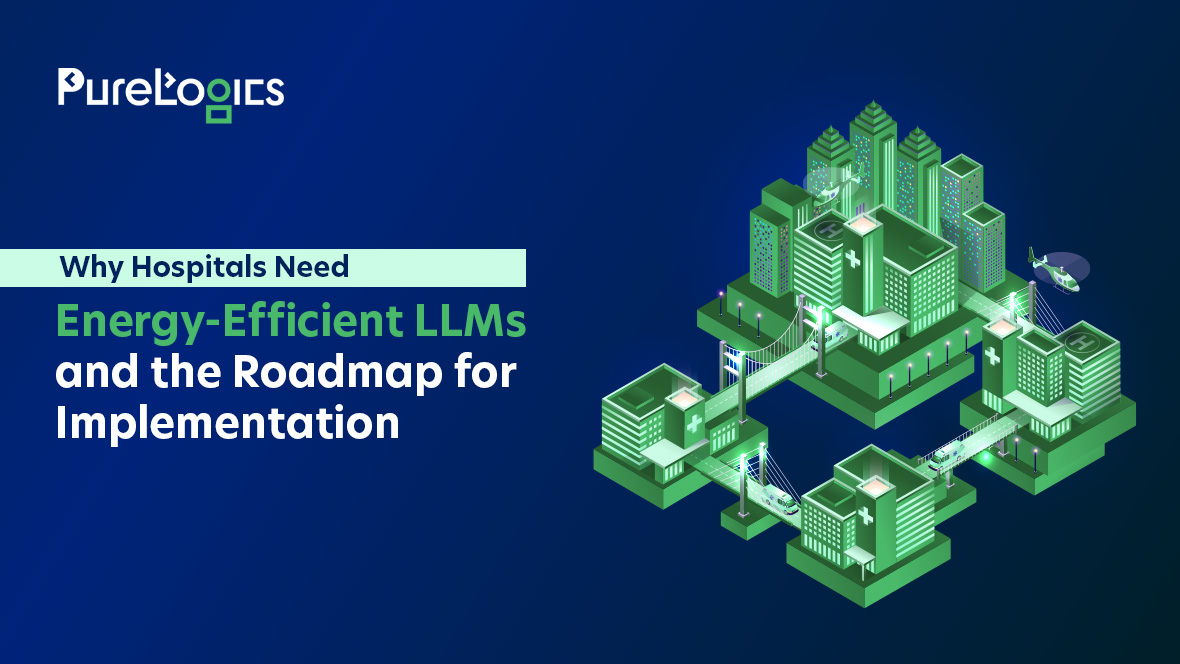Hospitals now face unprecedented challenges like rising operational costs, increasing regulatory pressure, growing patient expectations, and staff burnout. Indeed, the traditional solutions are no longer enough to meet these challenges. Additionally, the mounting pressure of being compliant with strict data protection regulations (HIPAA in the US and GDPR in Europe) is making the situation more difficult for healthcare executives. However, intelligent solutions like modern AI-powered hospital management software can help navigate these complexities, boost operational efficiency, improve patient care, and ensure long-term financial stability.
According to the Deloitte report on how AI can help hospitals strengthen their financial performance and reduce clinician burnout, 60-80% improvements in specific operational efficiency metrics can be achieved through AI/automation. Meanwhile, Gartner reports that up to 75% of healthcare IT budgets are consumed in the maintenance of legacy systems, clearly indicating that the healthcare industry has a long way to go in adopting technology.
Thus, C-suite executives need to understand the strategic value of modern healthcare software development. It is no longer about digitizing paperwork, but about getting actionable insights, predictive analytics, and operational efficiency that can impact patient outcomes.
Rising Need for Modern Hospital Management Software
The healthcare executives are under continuous pressure to do more with fewer resources. Staffing shortages, unpredictable patient volumes, and evolving regulatory demands are the top challenges. This has also effectively exposed the limitations of legacy systems. However, the hospital management solutions offer 360 degree view of operations, allowing proactive decision-making. It also turns the raw data into actionable insights, enabling the executives to predict challenges they can face rather than react to crises.
Furthermore, these solutions also offer full operational functionality, allowing proactive decision-making. They also have the capability to transform raw data into actionable insights, enabling executives to predict challenges rather than react to crises.
All in all, hospitals that fail to modernize can fall behind operationally and financially.
Why C-Suite Leaders Must Act
The technology landscape is rapidly transforming, changingthe needs of consumers and below are the more reasons why C-suites, especially those belonging to the healthcare sector, need to take digital transformation seriously.
- Operational pressure: Legacy software slows down work, leading to inefficiencies in billing, scheduling, and inventory management.
- Patient-Centric expectations: Patients are no longer passive users and expect an easy and smooth digital experience, whether it is online appointment scheduling or personalized care plans.
- Regulatory compliance: HIPAA, GDPR, and other compliance regulations require secure data storage and handling.
- Financial sustainability: Poorly managed revenue cycles, claim denials, and inefficient resource usage affect the profit margins negatively.
- Strategic advantage: A hospital that integrates modern hospital system management can effectively adopt care models like value-based care, leading to improved results and lower costs.
All in all, the hospital management system is essential to fulfill the operational gap generated by the legacy systems. Let us tell you how this software can overcome healthcare challenges more effectively than legacy systems.
Legacy Software vs. Intelligent Software: The Operational Gap
The healthcare industry is still reluctant to adopt modern healthcare solutions designed for the operational needs of the early 2000s. There is no doubt that custom healthcare software development can be a better option, providing features as per the needs of the healthcare institution and strategies like phased implementation and outsourcing have effectively reduce its development costs.
Now, let’s move on to how HMS systems can effectively help in mitigating the challenges that can arise from legacy software.
| Challenges | Legacy Software | Modern Hospital Management Software |
| Workflow | Manual | Automated |
| Patient Experience | Fragmented | Personalized |
| Decision-Making | Slow and reactive | Predictive analytics-driven |
| Scalability | Limited to on-premise servers | Cloud based |
| Compliance | High risk of errors | Audit-ready, compliant with data protection regulations |
| Data Silos | Data (billing, patient, and clinical) are stored separately | Real-time data exchange |
Legacy systems can indeed meet the minimum operational requirements, but when it comes to scalability and technology integration, intelligent and modern healthcare automation systems provide a competitive edge in both performance and care quality.
Modernize Your Hospital Management Today
Upgrade from legacy systems to a next-gen Hospital Management Software for streamlined operations and enhanced patient care.
Furthermore, these systems with their core capabilities can increase the efficiency of the healthcare ecosystems. Let us explain their core capabilities so that you can better understand their utility in your healthcare ecosystem.
Core Capabilities of Modern Hospital Management Software
The hospital automation systems are capable of increasing efficiency by eliminating silos and below are their core features.
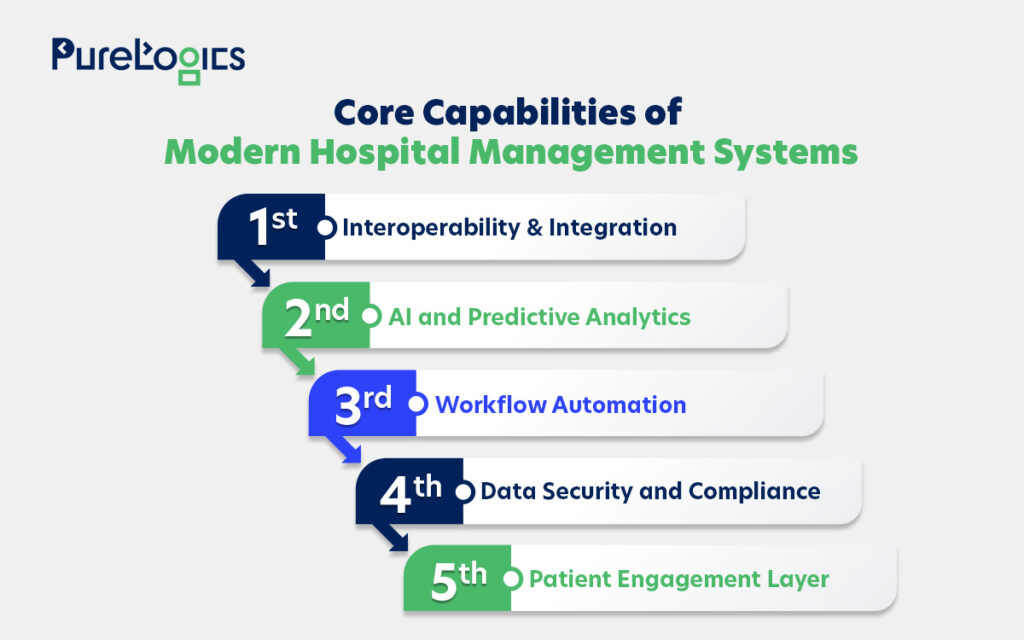
Interoperability and Integration
This software connects all clinical, administrative, and operational modules (EHRs, LIS, RIS, and IoT medical devices, etc.). It helps diminish silos, ensuring all departments work together and allowing executives to make decisions based on predictive analytics. The outcome is faster reporting, fewer errors, and improved collaboration with external care-providers.
AI and Predictive Analytics
The modern healthcare management software uses historical data to predict trends like bed occupancy, patient admissions, and readmission risks. This enables proactive resource allocation and clinical intervention, which helps reduce costs, especially in cases of overstaffing or underutilized resources. Consequently, leading to increased patient safety and supporting value-based care initiatives.
Workflow Automation
These systems automate repetitive administrative tasks like appointment scheduling, billing, claims management, and inventory tracking. This helps free clinical and administrative staff to focus more on patient care, reduce human error, and improve operational efficiency.
Data Security and Compliance
Features like encryption, role-based access, and audit trails in healthcare software help ensure compliance by protecting patient data. In addition to compliance, they have proved to be pivotal in increasing patient trust and preventing any potential data leakage.
Patient Engagement Layer
These systems contain features like appointment scheduling, telehealth consultation, automated reminders, and personalized care plans. These are crucial in increasing patient engagement and maintaining long-term loyalty.
No doubt, with these core capabilities, hospital workflows can be improved, along with reducing costs. Let us tell you more about how these systems can transform operational value.
Operational Value of Hospital Management Software in Transforming Hospital Workflow
The hospital management software can have an impact on hospital workflows in three different aspects, which are efficiency, financial performance, and strategic growth. Let us explain all these below:
Efficiency Gains
These systems can be effective in increasing the efficiency of hospitals, such as Omega Healthcare, with the help of AI-powered software witnessed a 40% reduction in time spent on documentation and a 50% faster turnaround on document processing (Business Insider). Furthermore, predictive analytics can help prevent bottlenecks in patient flow and discharge planning.
Financial Impact
The hospital can reduce administrative costs by implementing an AI-powered hospital management solution. The stats suggest that automation of administrative workflows in U.S. healthcare could reduce current costs by about 22% (CAQH Index). Plus, predictive analytics allow more innovative budgeting, helping CFOs make informed decisions regarding investments or resource allocation.
Strategic Planning
These solutions are equipped to provide actionable insights that help in the swift and easy adoption of any change in policy, such as value-based care, etc. Furthermore, it can help the C-suites make the best decisions regarding mergers and policy-making.
These benefits have also increased the popularity of hospital management solutions among healthcare circles.
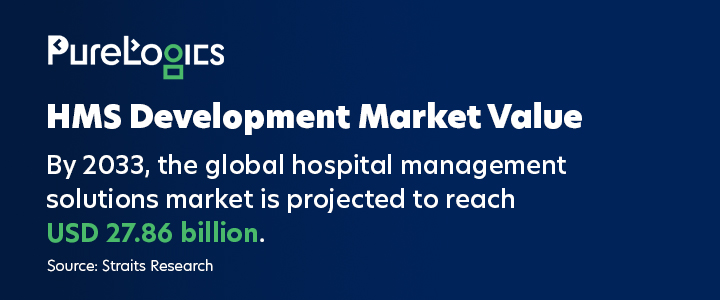
If you are looking to integrate hospital management software into your healthcare processes. Below is the roadmap to help you know where to begin.
Roadmap for Healthcare Management Software Integration: Guidance for the C-Suite
Below are the strategic steps that can help you align the software effectively with your organizational needs.
Assessment
The first step is to identify or recognize which modules are outdated or inefficient. This will also help in the effective assessment of operational pain points, map the workflows from admission to discharge, and highlight bottlenecks, delays, and manual dependencies. Furthermore, try to quantify the revenue losses from inefficiencies, billing errors, and claim denials. In addition to this, set the baseline for ROI analysis and prioritize initiatives that offer the highest impact.
Objective Definition
The second step is to set clear KPIs, for example, reduce ER wait times by 20% and improve billing accuracy by 40%. This will ensure that software integration supports the broader hospital strategy and efficient utilization and allocation of resources.
Software Company Selection
The third is to evaluate the healthcare software development companies in the market. In this assessment or evaluation, the critical part is to check their integration capabilities, especially if you have EHR, LIS, or IoT systems. All in all, the key to success is to hire the right healthcare software development company. This can also help reduce implementation risks.
Phased Implementation
The fourth step is phased implementation, which we have also discussed earlier,as it is an effective way to reduce overall development costs. The key point here is to pilot high-impact modules first and then concentrate on gradual integration to roll out additional modules, avoiding operational disruption. This will also help ensure smooth adoption and build confidence among stakeholders.
Staff Training for Change Management
The fifth and most crucial step is to ensure that your users understand the new workflow and tools, which means holding comprehensive staff training sessions. This will help reduce resistance, increase adoption, and make management software your asset.
Continuous Improvement
Implementation does not simply mean the end of the process! It is essential to track operational, clinical, and financial metrics regularly. Furthermore, it is important to use the insights from the software to improve processes and patient care delivery continuously. In this manner, the transformation will become sustainable and future-ready.
Conclusion
Adopting hospital management software is a strategic imperative to enhance operational efficiency, financial stability, and patient satisfaction. Embracing this software will help hospitals thrive in a competitive landscape and meet the regulatory demands with confidence.
In a nutshell, it is also essential to understand that digital transformation is not just software development; it is about embedding intelligence and predictive analytics into every aspect of hospital operations,too. Moreover, as hospitals look to the future, a strategic partnership with an experienced solution provider has become necessary. PureLogics, with its expertise and experience in the healthcare domain, designs and develops secure and scalable solutions that help clients achieve measurable outcomes. We have been in the industry for 19+ years building software that is compliant with data protection regulations such as HIPAA.
We are experts in integrating complex third-party systems, such as clearing houses, laboratories, and ePrescription platforms like Surescripts, and supporting key EMR modules such as claim management (RCM), ePrescription, and appointment scheduling, all fully compliant with interoperability standards like HL7, DICOM, and LOINC, etc. Book your 30-minute free consultation with our healthcare software developers and accelerate your digital transformation today.
FAQs
What are hospital management systems?
The hospital management systems (HMS) are software platforms designed and developed to automate the administrative, financial, and clinical operations of a hospital or healthcare facility. They are vital in managing patient records, appointments, billing, staff schedules, pharmacy inventories, laboratory results, and more, improving efficiency, accuracy, and overall patient care.
What are the types of hospital management systems?
These are clinical and patient management systems that can perform different functions depending on their different types:
- Inventory management
- Patient records and appointments
- Administrative systems for billing staff
- Laboratory systems managing tests and results
What are the functions of the Hospital Management System(HMS)?
They can manage and automate key hospital operations and functions, including maintaining patient records, scheduling appointments, managing billing and payments, tracking inventory or pharmacy supplies, handling laboratory and radiology reports, coordinating staff schedules, and ensuring smooth clinical and administrative workflows.


 [tta_listen_btn]
[tta_listen_btn]
 October 14 2025
October 14 2025

